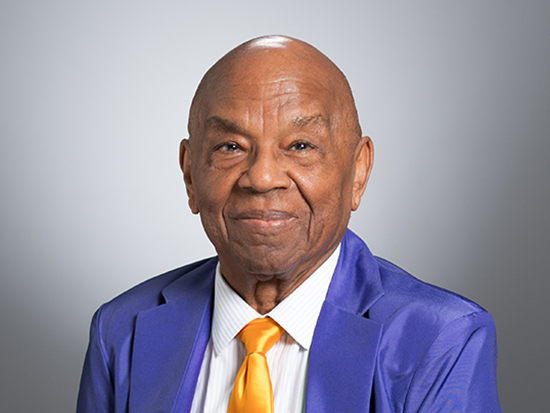 After earning a doctorate in chemistry in 1970, Johnny W. Scott, M.D., Ph.D., worked for a few years at Southern Research, then decided to go to medical school at UAB. He has served on the faculty in the Department of Radiology for 45 years. For much of that time, he was a dedicated high school football referee and is a devoted Blazer sports fan.Johnny W. Scott, M.D., Ph.D., professor of nuclear medicine in the Department of Radiology, was always interested in science — and football. Born and raised in Westfield, Alabama, a small Jefferson County community just outside Birmingham, Scott majored in chemistry at Clark College in Atlanta, then earned a master’s degree in nuclear chemistry from the University of Pittsburgh and, in 1970, a doctorate in physical chemistry from the University of Alabama in Tuscaloosa, doing his research on protein-protein interactions at the liquid-air interface in labs at UAB.
After earning a doctorate in chemistry in 1970, Johnny W. Scott, M.D., Ph.D., worked for a few years at Southern Research, then decided to go to medical school at UAB. He has served on the faculty in the Department of Radiology for 45 years. For much of that time, he was a dedicated high school football referee and is a devoted Blazer sports fan.Johnny W. Scott, M.D., Ph.D., professor of nuclear medicine in the Department of Radiology, was always interested in science — and football. Born and raised in Westfield, Alabama, a small Jefferson County community just outside Birmingham, Scott majored in chemistry at Clark College in Atlanta, then earned a master’s degree in nuclear chemistry from the University of Pittsburgh and, in 1970, a doctorate in physical chemistry from the University of Alabama in Tuscaloosa, doing his research on protein-protein interactions at the liquid-air interface in labs at UAB.
He worked for a few years as a scientist at Southern Research, interacting with UAB researchers, then decided to go to medical school. “I had to write all these proposals to get grants, and I decided, if you can’t beat them, join them,” Scott said with a laugh. He attended the UAB School of Medicine, graduating in 1975, and decided to specialize in imaging, “which seemed like a natural way to go, since it went along with what I had learned for my Ph.D.,” he said. After his residency training, Scott joined the UAB faculty in 1978 as an assistant professor of clinical pathology and nuclear medicine. He became as associate professor in 1983 and a full professor in 1991.
For the past 45 years, Scott has served UAB in a number of roles — some expected, for a professor of medicine, and others somewhat unorthodox. He was honored at this year’s Service Awards luncheon on April 10 along with two other 45-year honorees (Donna Andrews and Victor Jordan) and a 50-year honoree and fellow UAB physician, Richard Davis, M.D.
On Friday nights in the fall, when he was not working in the hospital, you could find Scott at local high schools, where he was a dedicated football referee. That interest helped lead to his appointment as the UAB Faculty Athletics Representative in 2000, a stint as the conference representative to the NCAA and a longtime association with the Blazer football program.
“For a while, I was a get-back coach for [Head Coach] Watson Brown,” Scott said. “I was down on the field with them throughout the game, and my primary responsibility was making sure players and coaches did not get penalties for being out in the field of play.”
Scott also served as assistant dean at the School of Medicine, directing efforts to recruit underrepresented students and faculty to the school. He was division director for molecular imaging and therapeutics in the Department of Radiology, chief of the Nuclear Medicine Service at the VA Medical Center and VISN7 Nuclear Medicine Consultant for the Southeast region, and a founder of the Jefferson County Sickle Cell Foundation. His nearly half-century at UAB has been “a pleasant experience,” Scott said. “The opportunities were there, and I was able to do the things I enjoy doing.”
These days, Scott spends a good deal of his days on the move. He is the pathology laboratory director for the UAB clinics in Hoover, Inverness, Gardendale and Leeds and works in UAB Hospital in nuclear medicine, particularly nuclear cardiology.
He no longer works as a referee, but he is an enthusiastic season ticket holder for UAB football and basketball, Scott says. Although he enjoyed being on the sidelines for Blazers games all of those years, he says his new seats at Protective Stadium have a much better view of the action. “I can see a lot more of the game now that I have seats in the stands,” Scott said.
Does he see himself reaching 50 years of service as a UAB employee? “I don’t have any definite plans,” Scott said. “I will do it until I decide I can’t.”